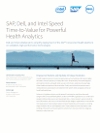 A health-related revolution is transforming industries such as healthcare, life sciences, higher education, consumer products, and the public sector. Empowered by automated diagnosis and treatment options, along with better access to information, patients are taking charge of their healthcare experience like never before. Today's activist health consumers expect medical decisions and products to be tailored to their specific needs and goals, so they can live full and healthy lives.
A health-related revolution is transforming industries such as healthcare, life sciences, higher education, consumer products, and the public sector. Empowered by automated diagnosis and treatment options, along with better access to information, patients are taking charge of their healthcare experience like never before. Today's activist health consumers expect medical decisions and products to be tailored to their specific needs and goals, so they can live full and healthy lives.
Advances in big data analytics provide powerful new ways to meet these demands. Using the SAP Connected Health platform, built on SAP HANA®, organizations can combine and analyze traditional data sources and vital patient data—clinical, research, personal medical, social information, and more. Armed with fresh analytic insights, organizations can accelerate their development of personalized, patient-centered treatments and innovations, including drugs, therapies, devices, and diagnostic tests. These insights can also help deepen understanding of the patient and expand patient involvement, to improve prevention, diagnosis, treatment, and patient care.
Download: SAP, Dell, and Intel Speed Time-to-Value for Powerful Health Analytics (.pdf, 384 KB).
Download from eHealthNews.eu: SAP, Dell, and Intel Speed Time-to-Value for Powerful Health Analytics (.pdf, 384 KB).